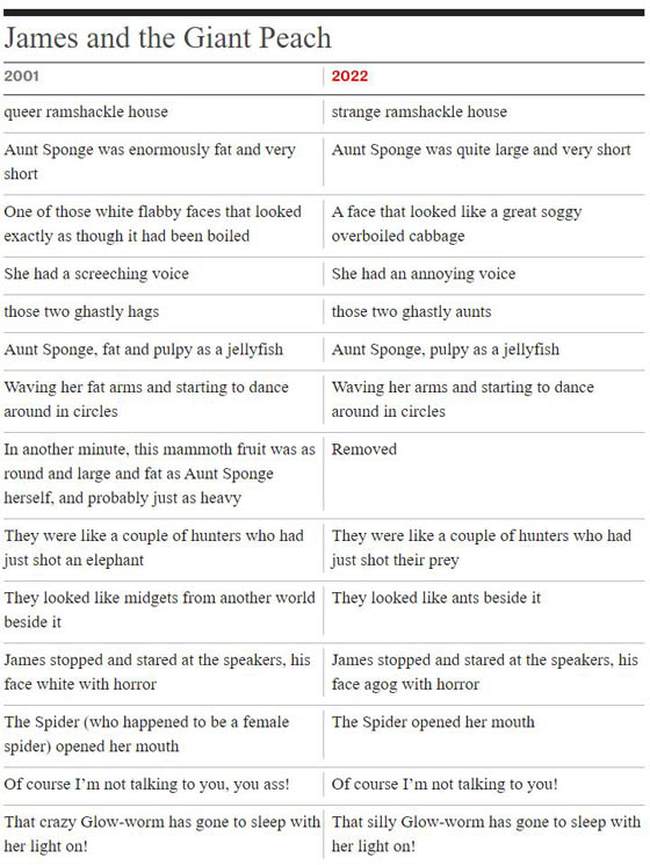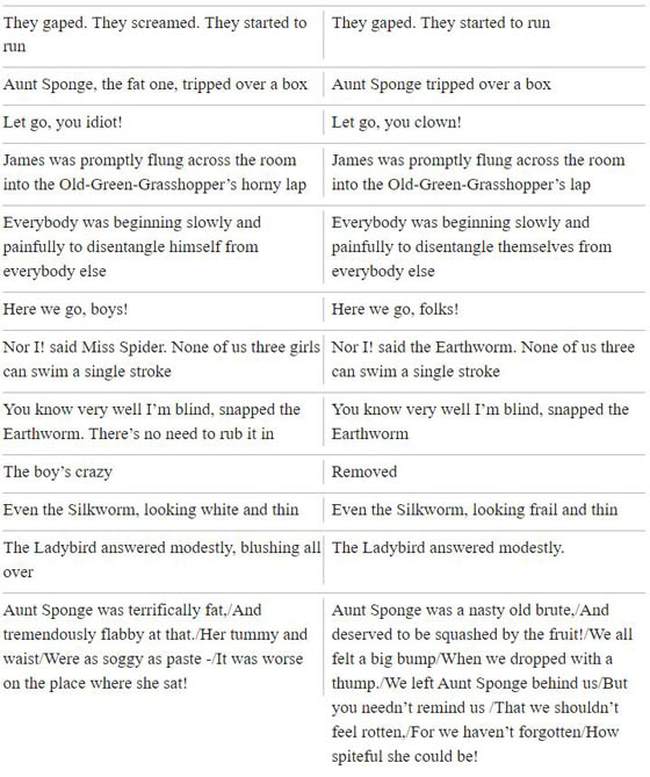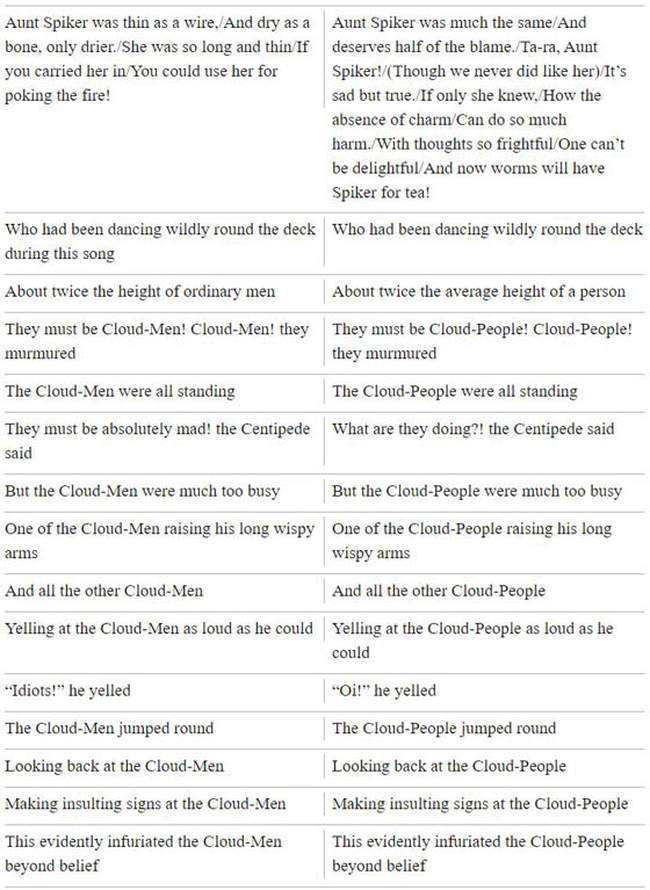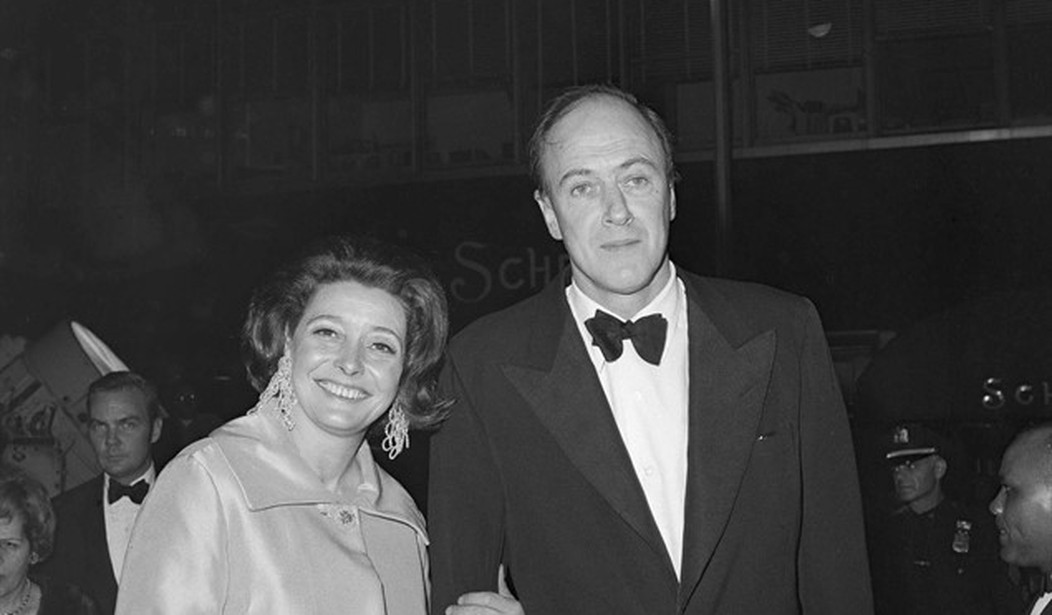If you have children you’re probably already familiar with Roald Dahl. His novels for kids include Charlie and the Chocolate Factory, Matilda, The BFG, and James and the Giant Peach. I read some of these books growing up and have since seen the movies based on the books.
When my son was in Elementary school we bought him a boxed set of Dahl’s children’s books (this one) and I read them to him before he could really read them himself. Dahl also wrote some great short stories for adults and a few screenplays including the script for one of my favorite James Bond movies, You Only Live Twice. So we’re big fans of his work in my house.
Yesterday the Telegraph reported that Dahl’s children’s books have gotten a rewrite with an eye toward removing any language which might be found offensive.
“Words matter,” begins the discreet notice, which sits at the bottom of the copyright page of Puffin’s latest editions of Roald Dahl’s books. “The wonderful words of Roald Dahl can transport you to different worlds and introduce you to the most marvellous characters. This book was written many years ago, and so we regularly review the language to ensure that it can continue to be enjoyed by all today.”
Put simply: these may not be the words Dahl wrote. The publishers have given themselves licence to edit the writer as they see fit, chopping, altering and adding where necessary to bring his books in line with contemporary sensibilities. By comparing the latest editions with earlier versions of the texts, The Telegraph has found hundreds of changes to Dahl’s stories.
Language related to weight, mental health, violence, gender and race has been cut and rewritten. Remember the Cloud-Men in James and the Giant Peach? They are now the Cloud-People. The Small Foxes in Fantastic Mr Fox are now female. In Matilda, a mention of Rudyard Kipling has been cut and Jane Austen added. It’s Roald Dahl, but different.
The individual changes are often small but there are a lot of them. For instance, the Telegraph found 59 changes in his book The Witches.
Take The Witches, for example, Dahl’s memorably unpleasant 1983 novel about a young boy growing up in a world ruled by a coven of secretive witches. A 2001 version of the text includes the following passage, about yanking women’s hair to check if they are witches. (In the story, witches are bald, and wear gloves to disguise their claws.)
Unsurprisingly given The Witches’ subject matter, many of the edits are to do with depictions of women. “Chambermaid” becomes “cleaner”. “Great flock of ladies” becomes “great group of ladies”. “You must be mad, woman!” becomes “You must be out of your mind!” “The old hag” becomes “the old crow”.
“A witch is always a woman”, went the 2001 version of the book. “I do not wish to speak badly about women. Most women are lovely. But the fact remains that all witches are women. There is no such thing as a male witch.” That became, simply, “A witch is always a woman. There is no such thing as a male witch.”
The revision of Dahl’s works isn’t a new phenomenon. The story notes that in the original version of Charlie and the Chocolate Factory, the Oompa-Loompas were Pygmies.
In the first edition of Charlie and the Chocolate Factory (1964), the Oompa-Loompas were black pygmies, enslaved by Willy Wonka from “the deepest and darkest part of the African jungle” and paid in cocoa beans. Dahl rewrote the characters in the late 1960s to “de-Negro” them, in his words. For Mel Stuart’s 1971 film starring Gene Wilder, the Oompas became green-haired, orange-skinned figures. By a 1973 edition of the book, they had become “little fantasy creatures”.
So fair enough, there are some changes without which the books would not have worked for modern audiences. But there’s a big difference between the author revising the work himself and having a group of sensitivity readers do it long after his death.
Puffin and the Roald Dahl Story Company made the latest changes in conjunction with Inclusive Minds, which its spokesperson describes as “a collective for people who are passionate about inclusion and accessibility in children’s literature”. Organisations such as Inclusive Minds have sprung up to help publishers navigate these newly choppy waters.
Alexandra Strick, a co-founder of Inclusive Minds, says they “aim to ensure authentic representation, by working closely with the book world and with those who have lived experience of any facet of diversity”. To do this, they call on a team of “Inclusion Ambassadors” with a variety of “lived experience”. She says they mostly work with authors writing now, but are sometimes asked to work on older texts.
This revision was undertaken just before Dahl’s entire catalog of children’s books was sold to Netflix in 2021. So we’re about to see a bunch of new Dahl moves and series in the coming years which will drive sales of the newly revised books.
What’s striking to me is that here in the US progressives are in the midst of a freak-out about the removal of books from school libraries. Some of these books have been described as pornographic by parents and critics. In several cases, parents have tried to read segments of the books to school boards and been cut off on the grounds that the books are too explicit. Here’s your trigger warning that all of these clips are NSFW.
WATCH: Cherokee County School District Chairwoman says a parent is “out of order” for describing sexually obscene material that the district gives to students.
If something is too obscene to be spoken about in front of adults, then it’s too obscene to be given to children. pic.twitter.com/N38G1HTBbe
— Jenny Beth Martin (@jennybethm) March 18, 2022
Another example:
UNREAL. Parent in @friscoisd reads from a pornographic book available to kids. A board member stops her and says “there’s a child in our board room.”
They acknowledge it’s inappropriate to read in front of children but these books can be in the school library. Make it make sense pic.twitter.com/VwpUBWOYnb
— Libs of TikTok (@libsoftiktok) November 17, 2022
And another:
And another. Watch as the adults grow uncomfortable with the reading aloud from a book that is available to 14-year-olds in the school library.
The response from the left has been to ignore this and simply claim the right is a) banning books and b) targeting LGBT students (several of the most explicit books involve gay relationships). The question of whether the material is appropriate for children never seems to come up unless a parent reads from the books at a school board meeting. Then they are cut off on the grounds that the books are obscene and there are children present.
Meanwhile, Roald Dahl’s infinitely better known and relatively tame children’s books are being revised by leftist sensitivity readers to shield the minds of young people from concepts like “fat.” Will the folks complaining about banning books from school libraries be equally upset about PC revisions to a famous authors works? I guess we’ll have to wait and see.
It seems to me there are two very standards operating here. One standard for leftist sensitives which are taken very seriously and one for conservative sensitivities which are scoffed at and ignored. There is a career path for people with leftist sensitivities. They can get jobs as sensitivity readers with major publishers. But parents who raise conservative sensitives about exposing young teens to depictions of sex between children or even forced sex, those sensitivities only provide work to the left-wing journalists mocking them in our newspapers as overly-religious, homophobic prudes.
The Telegraph story ends with a complete list of changes to each book. Here’s a sample of the changes made to James and the Giant Peach. I would dearly love to hear what the sensitivity readers who revised all of this would say about some of the prose highlighted in those clips above.












Join the conversation as a VIP Member